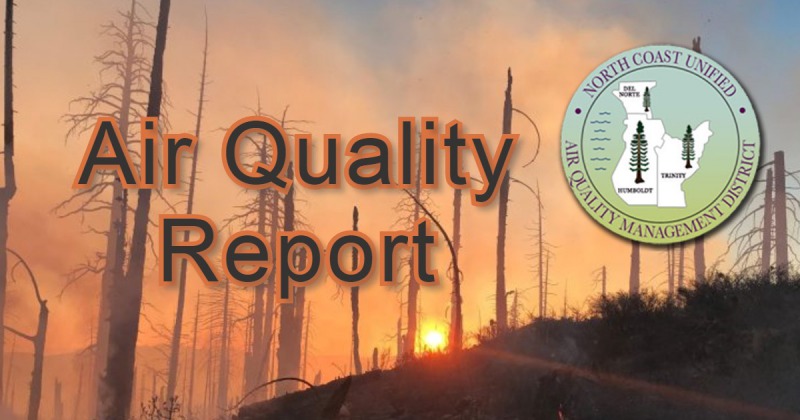Air Quality Better in Many Areas But Still Not Good
 Press release from North Coast Air Quality Management District:
Press release from North Coast Air Quality Management District:
…No Air Quality ALERTs have been issued today. Air quality monitors can be viewed at https://fire.airnow.gov.
The ARA on the Red Salmon fire indicates that air quality is likely to improve today and tomorrow. However, smoke will combine with other fires in the area which could keep some areas in the Unhealthy range, depending on proximity to the fires. The ARA on the Slater/Devil Fire forecasts Southerly transport of combined smoke from the Slater/Devil fires and active fires to the south will be somewhat moderated today; however smoke will continue to significantly impact areas to the north. The ARA on the August Complex West fire indicates that fire activity will remain high and air quality will remain Unhealthy depending on proximity. Unhealthy conditions are expected overnight in the river drainages.
Coastal areas will see noticeable improvement during the day; however, smoke lingering offshore may return overnight. This is expected to continue until later in the week when a chance of precipitation and an increase in onshore flow may bring a period of improvement to the interior valleys. Weather conditions and fire activity will continue to push smoke from southern fires (August Complex, Oak Fire, and Elkhorn/Hopkins) to impact the communities in Southern Humboldt and Trinity County northward.
Humboldt County – Air Quality ADVISORY issued today for Orleans, Hoopa, Weitchpec.
- Eureka (including Rio Dell to Trinidad) – Moderate with periods of Unhealthy for Sensitive Groups to Unhealthy possible depending on location.
- Orleans – Unhealthy likely with periods of Very Unhealthy conditions possible.
- Weitchpec – Unhealthy likely with periods of Very Unhealthy conditions possible.
- Hoopa – Unhealthy likely with periods of Very Unhealthy conditions possible.
- Willow Creek – Unhealthy for Sensitive Groups with periods of Unhealthy conditions.
- Garberville & Redway and nearby communities – Generally Moderate but with periods of Unhealthy of Sensitive Groups or worse depending on conditions.
Del Norte County – No Air Quality ADVISORY issued today.
- Crescent City – Mostly Moderate with possible periods Unhealthy for Sensitive Groups.
- Gasquet – Mostly Moderate with possible periods Unhealthy for Sensitive Groups or worse at night.
- Klamath – Overall Moderate but with periods of Unhealthy for Sensitive Groups.
Trinity County – Air Quality ADVISORY issued today for Weaverville, Hayfork, Trinity Center, and Ruth, Zenia-Kettenpom, Trinity Pines areas.
- Weaverville and surrounding communities – Mostly Unhealthy conditions.
- Hayfork – Mostly Unhealthy with periods of Very Unhealthy conditions.
- Trinity Center – Mostly Unhealthy with periods.
- Ruth, Zenia-Kettenpom, Trinity Pines – Mostly Unhealthy conditions with periods of Very Unhealthy or worse depending on conditions.
Air Quality Index
(AQI Value)
PM 2.5
24hr avg
(ug/m3)
Actions to Protect Yourself
Good (0-50)
0-12
None
Moderate (51-100)
12-35
Sensitive individuals should consider limiting prolonged or heavy exertion
Unhealthy for Sensitive Groups [USG] (101-150)
35-55
People within USG should reduce prolonged or heavy outdoor exertion
Unhealthy (151-200)
55-150
People within USG should avoid all prolonged or heavy outdoor exertion
Very Unhealthy (201-300)
150-250
Everyone should avoid prolonged or heavy exertion
Hazardous (>300)
250-500
Everyone should avoid any outdoor activity
Particulate Matter (PM2.5) monitors are located in Crescent City, Gasquet, Eureka, Weaverville, Hoopa, Weitchpec, Willow Creek, Klamath, Trinity Center, Bridgeville, and Garberville. Updates will be provided as conditions change.
Fire information can be found at http://inciweb.nwcg.gov/ or https://fire.airnow.gov/. Current weather information can be found at www.wrh.noaa.gov.
As with all wildfires, ash fallout is possible depending on fire activity and proximity to the fires. Ash fallout information can be found in the Wildfire Smoke Resources section of our webpage at www.ncuaqmd.org.
Health Information for Smoke Impacts
Concentrations of smoke may vary depending upon location, weather, and distance from the fire. Smoke from wildfires and structure fires contain harmful chemicals that can affect your health. Smoke can cause eye and throat irritation, coughing, and difficulty breathing. People who are at greatest risk of experiencing symptoms due to smoke include: those with respiratory disease (such as asthma), those with heart disease, young children, and older adults.
These sensitive populations should stay indoors and avoid prolonged activity. All others should limit prolonged or heavy activity and time spent outdoors. Even healthy adults can be affected by smoke. Seek medical help if you have symptoms that worsen or become severe.
Follow these general precautions to protect your health during a smoke event:
- Minimize or stop outdoor activities, especially exercise.
- Stay indoors with windows and doors closed as much as possible.
- Do not run fans that bring smoky outdoor air inside – examples include swamp coolers, whole-house fans, and fresh air ventilation systems.
- Run your air-conditioner only if it does not bring smoke in from the outdoors. Change the standard air conditioner filter to a medium or high efficiency filter. If available, use the “re-circulate” or “recycle” setting on the unit.
- Do not smoke, fry food, or do other things that will create indoor air pollution.
If you have lung disease (including asthma) or heart disease, closely monitor your health and contact your doctor if you have symptoms that worsen.
Consider leaving the area until smoke conditions improve if you have repeated coughing, shortness of breath, difficulty breathing, wheezing, chest tightness or pain, palpitations, nausea, unusual fatigue, lightheadedness.
Updated guidance from the CDC is available on reducing wildfire smoke exposure given COVID-19 considerations: https://www.cdc.gov/disasters/covid-19/reduce_exposure_to_wildfire_smoke_covid-19.html.
For further information, visit the District’s website at www.ncuaqmd.org or call the District’s Wildfire Response Coordinator at (707) 443-3093 x122.

Join the discussion! For rules visit: https://kymkemp.com/commenting-rules
Comments system how-to: https://wpdiscuz.com/community/postid/10599/
“Very Unhealthy or worse depending on conditions.”…pretty sure I am in the “worse” catagory